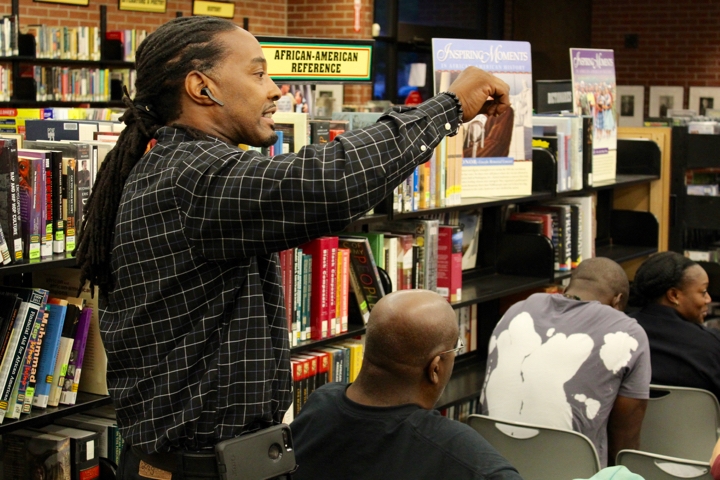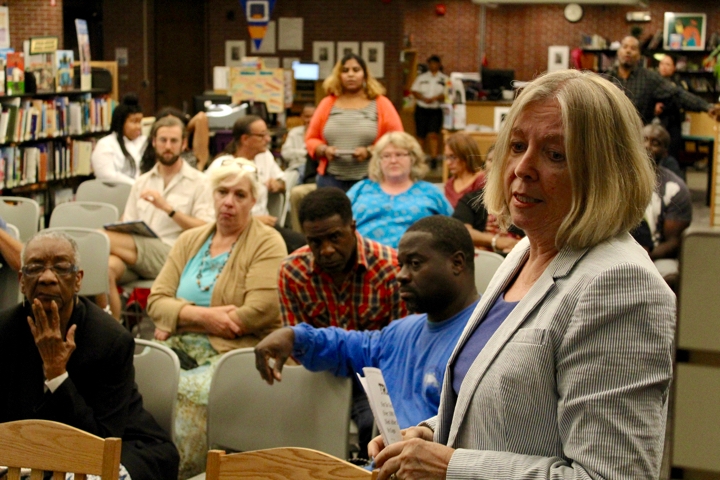
Christopher Peak Photo
Crowd grills Chief Campbell at Stetson Thursday night.
New Haven’s police chief isn’t interested in the new military gear the Trump administration wants to send to cities, but he does agree with the administration’s stand against legalizing marijuana.
Those stances on hot-button political issues emerged in a tense community meeting at Stetson Library in Dixwell Thursday night, the second in a series of forums with top cops aimed at improving community relations.
About two dozen people, half the size of the first event, showed up to lob questions at Campbell. Most of the evening focused on the handling of internal affairs complaints; the chief also mused on current events and explained department protocol. Even with the smaller turnout, the event stretched on for two and a half hours — and probably would have gone longer with questions still unanswered, but librarians had to turn the lights out and go home.
The next meeting is tentatively scheduled for Sept. 28, from 5:30 – 8:30 p.m.

Barbara Fair, ACLU-CT’s Dan Barrett, Police Chief Anthony Campbell.
The forums were organized in the wake of a clash that pitted white supremacists and neo-Nazis against anti-racism and antifascist counter-demonstrators in Charlottesville, Virginia. The violence there echoed a July 8 clash on the New Haven Green by a group known as the “Proud Boys” and the subsequent arrest of four of the 150 counter-protesters, one of whom was longtime activist Barbara Fair.
“We’re hoping that this will be a very productive meeting, with lots of information that people can find out,” she said at the start of the meeting.
The crowd proceeded to pepper the chief with questions about policing equipment, drug use, internal investigations and external oversight.
Arming The Cops

Fair: Define community policing.
On Monday, in a speech to the police union in Nashville, U.S. Attorney General Jeff Sessions said the president will overturn a ban on surplus military equipment being sent to police departments. Sessions said the move will “send a strong message that we will not allow criminal activity, violence, and lawlessness to become the new normal.” Among the “lifesaving gear,” as he dubbed it, available to cops will be grenade launchers, armored vehicles, rifles and riot gear.
None of that will make its way to New Haven, Campbell stated to the gathering Thursday night.
“For many years, there’s been the ability for us to get that type of military equipment, but we have no interest in that. I don’t see the purpose for equipment that typically is used by the military to be deployed against American citizens,” he said, to murmurs of affirmation. “It was presented [as a way] that police departments could protect themselves. As far as I’m concerned, we’re not fighting a war; we’re fighting crime. So, I don’t think we really need military equipment. We will not be acquiring any of it, so long as I’m the chief.”
Through what was known as the 1033 program, surplus military equipment was made available to cops, at no charge, since 1990. That changed in 2015, when the sight of armored vehicles rolling down the streets of Ferguson, Missouri, as black protesters shouted, “Hands up! Don’t shoot!” led the Obama administration to end the handouts. Campbell said he worried about how more imagery like that, from other police departments who are stocking up, could affect perceptions of the entire profession.
Over at New Haven police department headquarters at 1 Union Ave., by contrast, “All of the equipment that we have in the police department is designed to make sure that our officers have the safest tools available to them to get the job done,” Campbell said.
That led to more questions about what equipment is appropriate for local police to use on citizens. For instance, what did Campbell think about the use of dogs?
In February, when anti-Trump protesters took over Route 34, troopers sicced a dog on the group. Ironically, the canine ended up biting cops. (“That was a good dog,” one of the moderators said, as the meeting that sometimes veered into contempt.)
Campbell said a dog would not be his first go-to for crowd control at an event. “Dogs can be aggressive, and dogs, especially if there are a lot of people, a lot can happen,” he said. “You really have to make a determination based on whatever the situation is, whether or not you’re going to use the dog.”
But he plans to continue using them for other policing, he said. “For the specific tasks they’re trained for, they’re phenomenal tools. We use them all the time to track down burglars, track down weapons that are thrown by people as we’re trying to apprehend them. And they can be used to flush people out: If you have a break-in, you say, ‘Come out, come out. We’re going to send the dog in.’ They’re very effective.”
Tasers?
The stun-guns are formally called “conducted electronic weapons.” Only one-fifth of New Haven officers carry them, Campbell said; the officers are trained specifically to do so. Campbell said he is now looking to buy a Taser for every officer on the force.
At the meeting, Fair passed around copies of a news article pointing out that while the stun-guns are less lethal than guns, they’ve still been known to kill. Others asked Campbell if the weapon was compatible is community policing.
“We’ve found it reduces the amount of force that has to be used by an officer. It protects the officer as well as the individual,” Campbell responded. “Tasers, believe it or not, are what we call less lethal force. Just as when I use pepper spray, I don’t know if you have a preexisting condition [like] a breathing disorder or maybe pregnant, but it is a piece of equipment which the state has approved us to use. I do understand that there have been people who have died as a result of Taser deployment. That is something that we take into consideration. What we have found is that the benefits outweigh the costs.”

Rev. John Lewis: I’d rather be Tased than shot.
Campbell added that the stun-guns are governed by strict protocol. The shocks last for only five seconds before an officer has to pull the trigger a second time. That deployment data, tracked by the device, is supposed to be downloaded and saved after every use. Immediately after, an officer is supposed to call an ambulance for medical treatment, and cops aren’t allowed to remove the prongs themselves.
That led to some debate among the audience.
“They may be less lethal, but they’re lethal,” Fair said. “If I’m Tased to death, I’m still dead,” Fair said.
“The likelihood of you dying for a gunshot wound is far greater than a Taser,” Campbell answered.
That was echoed by Rev. John Lewis, of Life Center Ministry, whocoordinates outreach for the Connecticut Center for Nonviolence and is currently working with police cadets in the academy on deescalation tactics.
“They can be harmful and people can die, but I would much rather have a Taser in the hands of police that has not yet engaged the community yet,” Lewis said, referencing rookie cops. “I would much rather be Tased than shot. For me and my son, as African-American males, that’s important.”
“I don’t want either,” Fair countered. “Here’s my thing with community policing: Why do we need Tasers, guns, all that stuff if this is community policing?”
Campbell didn’t get a chance to answer, before he got cut off by the next question.
Legalization

Campbell: Drugs are destructive.
While Campbell might have taken a liberal perspective on militarizing the police, he took a harder line on marijuana.
“I say no drug should be legalized — not marijuana, nothing — because to me, it’s the root cause of the destruction of so many of our families,” said Campbell, who said he has never tried weed personally. “Half of the problem [in law enforcement] is our resources being expended, not so much from drug sales, but people being addicted. It starts out with marijuana, nicotine, alcohol: You’re going down a path that’s destructive.”
He added, “I don’t think that having wholesale legalization of alcohol, marijuana and other things is going to be the thing that saves us.”
Connecticut’s legislature debated a bill this year to legalize and tax recreational use of marijuana. It failed. The proposal is expected to resurface, partly because of the state’s ongoing budget woes, partly because neighboring states have legalized recreational pot.
Partly Campbell arrived at those views because of his personal background, he explained, exhaling a deep breath. “This goes to my moral convictions, my Christian convictions. I teach my kids: Don’t mess with drugs.” Why? “My father was a drug dealer. You name it, he sold it: He started out with weed, ultimately with crack. And I view that as the reason for his death,” Campbell said.
In“If it was up to me — I don’t drink and I don’t approve of it, especially coming from a family that’s struggled with alcoholism,” Campbell said. “Drink water. If you really want to go crazy, drink some Kool-Aid. And if you really want to go buck wild, have a Sprite.”

Patricia Kane: If you want to cut drug use, decriminalization does that best.
That sparked laughs, then further debate.
Attorney Patricia Kane argued that the current punitive system in America doesn’t appear to be reducing drug use. Instead, she suggested that the chief look to Portugal, where drug use is treated medically. “Portugal decriminalized all of its drug laws, just eliminated it. Drug use went down, all crime went down. And they have one drug enforcement officer for the entire country of Portugal,” Kane stated. “So, contrary to what we feel might happen, the outcomes are actually better when we don’t make something prohibitive, drive up the street price, and increase crime to access the drugs.”
Campbell disputed whether that would work here: “America’s a very unique country. We have 5 percent of the world’s population, and yet we utilize 95 percent of the opioids that are produced. We are a drug country, and we have been for a long time,” he said. “I think that things like alcohol, marijuana and the proliferation of weapons in our country is outrageous. When you combine all of these things, you’ve got a cocktail for the level of violence, incarceration that we’re experiencing in this country. Simply decriminalizing, legalizing these drugs is not the answer. I think we need to get back to our roots.”